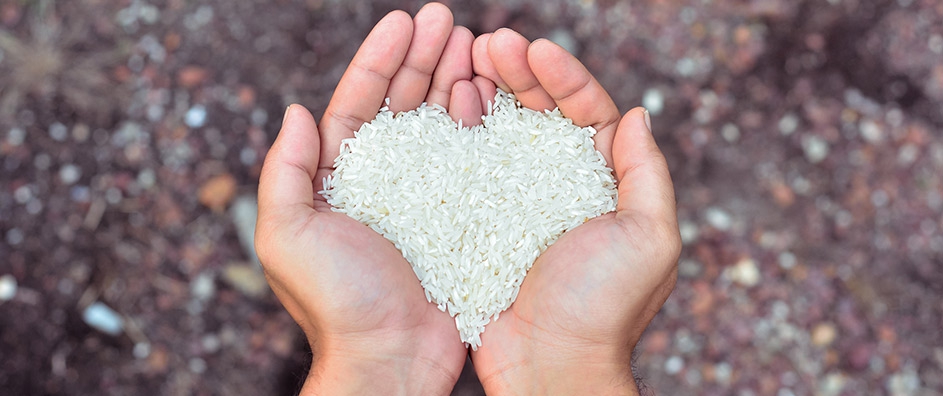The views expressed in our content reflect individual perspectives and do not represent the authoritative views of the Baha'i Faith.
Nearly half of the world’s population—more than 3 billion people—live on less than $2.50 a day. More than 1.3 billion live in extreme poverty—less than $1.25 a day.
A billion children worldwide live in poverty. According to UNICEF, 22,000 children die each day due to poverty, malnutrition and starvation.
That means almost half of the world’s people struggle daily just to survive. Of course, you probably already know this—after all, the world is well aware of this dire problem. Countless non-profit and for-profit organizations work tirelessly, mostly with volunteers, to alleviate this suffering.
We all suffer when poverty exists. How long will it take to raise the standard of living for all peoples, cultures and nations? Is there no end to the continued devastation that poverty reeks? Is there one solution we can agree on that will solve this seemingly intractable problem?
There is one solution, and only one: a reordering and spiritualization of society, so that the needs of the poor are placed higher than the wants of the wealthy. The Baha’i teachings say that only a spiritual solution to this economic problem will work. Abdu’l-Baha explains:
The arrangements of the circumstances of the people must be such that poverty shall disappear, and that every one as far as possible, according to his position and rank, shall be comfortable. Whilst the nobles and others in high rank are in easy circumstances, the poor also should be able to get their daily food and not be brought to the extremities of hunger. – Abdu’l-Baha in London, p. 29.
There will always be differences in our human condition. Just as in nature, that is the natural order of this contingent world. However, that does not mean the extremes we see today between wealth and poverty should continue. We need a fresh set of economic policies we can work towards and apply across the globe.
There are many practical ways to solve this problem from the Baha’i view. Here are seven:
1. Tax wealth progressively The more one earns wealth beyond that which is needful, the higher their taxes, to help pay for the needs of all society. This is called progressive income tax—a noble, fair concept already adopted by many of the world’s nations. Flat taxes disproportionately hurt the poor.
2. Educate the people from early childhood in all arts and sciences, to obtain skills and abilities to work gainfully and satisfy one’s own needs. This is also being universally applied, and is self-evident. Higher education and specific skills training should be available to all at reasonable and justified costs.
3. Elevate work to the level of worship and service to humanity. Whether we produce products or provide services, they should help not hinder humanity’s progress and security.
4. Volunteer time and energy to provide well-being, not only for ourselves and our own families but all peoples and nations. Hundreds of thousands of worthy organizations and religions provide selfless help to all, their members and non-members, high and low alike.
5. Promote free trade. Eliminate tariffs which hinder the free exchange of products and goods across state and national boundaries.
6. Institute and apply universal laws, rules, regulations and standards. An example here would be the provision of utility services, such as clean water, sewer, electricity and natural gas, communications and more. The rule of law must guide all societies and all transactions.
7. Institute profit-sharing in all businesses. This Baha’i principle fairly and equitably rewards both workers and owners for their labor and their capital expenditures.
The Baha’i teachings have many more economic principles, all with the goal of alleviating the extremes of wealth and poverty.
Baha’is believe that the world’s extreme disparities in wealth and poverty have become unconscionable. All nations and peoples have the right to live well and do well—in this modern global civilization, we have sufficient resources to make sure no one starves or has no home.
Many wealthy nations share their wealth for the betterment of nations and the world with the hopes of improving the human condition. Improving those conditions creates jobs and commerce, expands education and feelings of self-worth in the individual, and provides for the general welfare and well-being of all the world’s citizens. Raising the living standards of the poorest people in the world contributes to everyone’s welfare. Reducing poverty contributes to fewer diseases, more economic productivity, lower crime rates and a better quality of life for everyone.
Can anyone of sound mind and heart deny the benefits, whether on a personal or national level, of sharing one’s wealth with all the world’s peoples? Baha’u’llah wrote over one hundred years ago:
With the utmost friendliness and in a spirit of perfect fellowship take ye counsel together, and dedicate the precious days of your lives to the betterment of the world and the promotion of the Cause of Him Who is the Ancient and Sovereign Lord of all. He, verily, enjoineth upon all men what is right, and forbiddeth whatsoever degradeth their station. – Gleanings from the Writings of Baha’u’llah, p. 184.
Perhaps the best and only way of achieving all our mutual goals involves believing in the dignity and wholeness of the human race without equivocation.
















Comments
Sign in or create an account
Continue with Googleor